Oratoire du Louvre
The Temple protestant de l'Oratoire du Louvre, also Église réformée de l'Oratoire du Louvre, is a historic Protestant church located at 145 rue Saint-Honoré – 160 rue de Rivoli in the 1st arrondissement of Paris, across the street from the Louvre. It was founded in 1611 by Pierre de Bérulle as the French branch of the Oratory of Saint Philip Neri. It was made the royal chapel of the Louvre Palace by Louis XIII on December 23, 1623, and was host to the funerals of both Louis and Cardinal Richelieu. Work on the church was suspended in 1625 and not resumed until 1740, with the church completed in 1745.
| Oratoire du Louvre | |
|---|---|
Temple protestant de l'Oratoire du Louvre | |
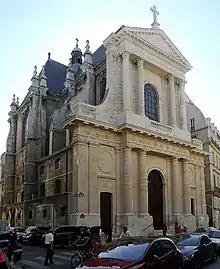 Front of the church from rue Saint-Honoré | |
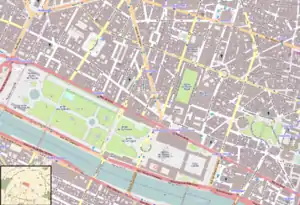 Oratoire du Louvre The location of l'Oratoire within Paris | |
| 48°51′42.7″N 2°20′25.1″E | |
| Location | Paris |
| Country | France |
| Denomination | United Protestant Church of France |
| Previous denomination | Reformed Church of France |
| Churchmanship | Liberal[1] |
| Website | oratoiredulouvre.fr |
| History | |
| Former name(s) | La congrégation de l'Oratoire de Jésus |
| Authorising papal bull | 1613 |
| Status | Parish church |
| Founded | November 1611 |
| Founder(s) | Pierre de Bérulle |
| Consecrated | July 12, 1750 |
| Events | Made royal chapel of the Louvre Palace by Louis XIII (1623); suppressed during the French Revolution (1792); Protestant church (1811) |
| Associated people | Louis XIII, Cardinal Richelieu, Anne of Austria, Paul-Henri Marron |
| Architecture | |
| Functional status | Active |
| Heritage designation | |
| Designated | 1907 |
| Architect(s) | Jacques Lemercier, Clément Métezeau, Pierre Caqué |
| Architectural type | Christian Church |
| Style | Baroque |
| Years built | 1621–1625, 1740–1745 |
| Groundbreaking | September 22, 1621 |
| Completed | 1745 |
| Administration | |
| Synod | Synode régional d'Île-de-France |
| Clergy | |
| Pastor(s) | Agnès Adeline-Schaeffer Béatrice Cléro-Mazire |
It was suppressed in 1792 during the French Revolution, looted, stripped of its decor, and used to store theater sets. In 1811, it was given by Napoleon to the Protestant congregation of Saint-Louis-du-Louvre when that building was demolished to make way for the expansion of the Louvre.[3] A statue and monument of Admiral Gaspard de Coligny, the great Huguenot leader of the 16th century, was built on the rue de Rivoli end of the church in 1889. It continues as one of the most prominent Reformed congregations in Paris, noted for its liberal theology.[4] The closest métro station is Louvre – Rivoli. ![]()
![]()
Prominent pastors
- Paul-Henri Marron 1811-1832
- Jacques Antoine Rabaut-Pommier 1811-1816
- Jean-Frédéric Mestrezat 1811-1807
- Henri François Juillerat 1816-1867
- Frédéric Monod 1819-1849
- Athanase Josué Coquerel 1832-
- Joseph Martin-Paschoud 1836-1866
- Adolphe Monod 1847-1856
- Matthieu Rouville 1850-
- Auguste-Laurent Montandon 1860-1906
- Numa Recolin 1882-1893
- Auguste Decoppet 1882-1906
- Ariste Viguié 1882-1891
- Jules-Émile Roberty 1891-1925
- Élisée Lacheret 1893-1902
- Théodore Monod 1902-1906
- John Viénot 1906-1932
- Wilfred Monod 1907-1938
- Paul Vergara 1922-1954
- André-Numa Bertrand 1926-1946
- Émile Guiraud 1933-1937
- Gustave Vidal 1938-1960
- Élie Lauriol 1946-1961
- Pierre Ducros 1954-1968
- René Château 1961-1978
- Bernard Reymond
- Laurent Gagnebin 1963-1965
- Christian Mazel 1964-1988
- André Pierredon
- Jean-Michel Perrault 1995-2003
- Pierre-Yves Ruff 1997-2001
- Werner Burki 2003-2008
- Florence Taubmann 2003-2007
- Marc Pernot 2007-2017
- James Woody 2009-2016
- Richard Cadoux 2017-2018
- Béatrice Cléro-Mazire 2018-présent
- Agnès Adeline-Schaeffer 2019-présent
Gallery
- Interior
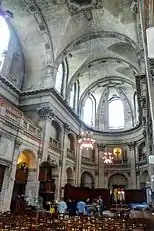 The pulpit and choir
The pulpit and choir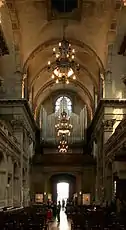 The nave and organ
The nave and organ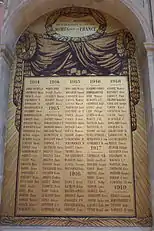 Memorial to church members killed in World War I
Memorial to church members killed in World War I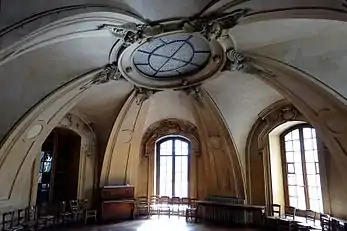 The upper room, onetime home to the American Church in Paris and later The Scots Kirk, Paris
The upper room, onetime home to the American Church in Paris and later The Scots Kirk, Paris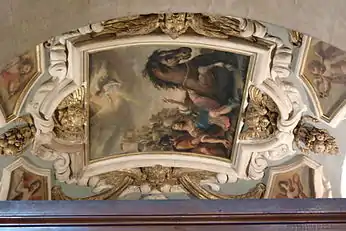 Decoration that survived the French Revolution
Decoration that survived the French Revolution
- Exterior
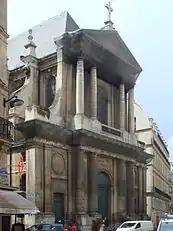 The facade before restoration work, from rue Saint-Honoré
The facade before restoration work, from rue Saint-Honoré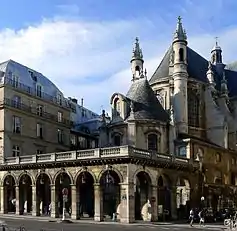 View of the church from Rue de Rivoli
View of the church from Rue de Rivoli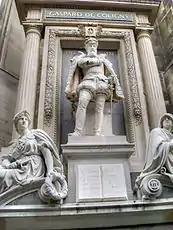 Statue of Gaspard de Coligny
Statue of Gaspard de Coligny
References
- "Bienvenue". L'Église Protestante Réformée de l'Oratoire du Louvre à Paris. Archived from the original on 2017-03-07. Retrieved 2015-04-14.
- "Temple de l'Oratoire du Louvre (ancienne chapelle du couvent de l'Oratoire)". Monuments Historique. Ministère de la Culture.
- "The Temple de l'Oratoire". Musée protestant. Retrieved 2021-01-19.
- "L'histoire de l'Oratoire". l'Oratoire du Louvre. Archived from the original on 2016-03-20. Retrieved 2015-04-14.
Sources
- Braunstein, Philippe (2011). L'Oratoire du Louvre et les protestants parisiens. Paris: Labor et Fides. ISBN 978-2830914320.
External links
| Wikimedia Commons has media related to Temple protestant de l'Oratoire du Louvre (Paris). |
- Official website (in French)